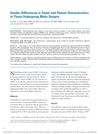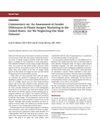 152 citations,
December 2007 in “Gender Medicine”
152 citations,
December 2007 in “Gender Medicine” Male and female skin differ due to hormones, affecting conditions like hair loss, acne, and skin cancer, and suggesting a need for gender-specific treatments.
[object Object]  27 citations,
February 2020 in “Journal of Cardiovascular Translational Research”
27 citations,
February 2020 in “Journal of Cardiovascular Translational Research” Women generally handle heart enlargement better than men, but it's riskier for them if it occurs; hormones like estrogen offer some protection.
 20 citations,
January 2012 in “Journal of Steroids & Hormonal Science”
20 citations,
January 2012 in “Journal of Steroids & Hormonal Science” The document concludes that there are still unknowns about the effectiveness, risks, and detection of performance-enhancing drugs, and doping remains a challenge.
 11 citations,
November 2015 in “Skin Research and Technology”
11 citations,
November 2015 in “Skin Research and Technology” Women's hair grows faster and thicker than men's, but hair growth slows for both genders with pattern hair loss.
 10 citations,
May 2017 in “PLOS ONE”
10 citations,
May 2017 in “PLOS ONE” Men and premenopausal women in Korea show different patterns in iron and vitamin D levels, with no clear pattern for postmenopausal women.
 8 citations,
June 2014 in “PubMed”
8 citations,
June 2014 in “PubMed” Men are more likely to have larger basal cell carcinomas and squamous cell carcinomas, while women have more superficial basal cell carcinomas and tumors on their legs and central face.
 4 citations,
June 2018 in “PLOS ONE”
4 citations,
June 2018 in “PLOS ONE” Iron levels are linked to insulin resistance in men and postmenopausal women, but not in premenopausal women.
 4 citations,
July 2021 in “International Journal of Environmental Research and Public Health”
4 citations,
July 2021 in “International Journal of Environmental Research and Public Health” Women who lost hair from childhood head radiation are more likely to face mental health issues than men.
 September 2014 in “Springer eBooks”
September 2014 in “Springer eBooks” Men and women experience skin aging differently due to changes in sex hormone levels with age.
November 2024 in “Skin Appendage Disorders” Start low-dose minoxidil gradually, especially for women, to reduce side effects.
 November 2021 in “World Family Medicine Journal /Middle East Journal of Family Medicine”
November 2021 in “World Family Medicine Journal /Middle East Journal of Family Medicine” Men and women with diabetes in Jeddah, Saudi Arabia, experience different symptoms and complications.
 January 2018 in “Springer eBooks”
January 2018 in “Springer eBooks” Men and women need different facial rejuvenation treatments due to distinct aging processes and anatomical differences.
 205 citations,
July 2009 in “Journal of Dermatological Science”
205 citations,
July 2009 in “Journal of Dermatological Science” Male and female skin differ in many ways, which could lead to gender-specific skin treatments.
 125 citations,
August 2020 in “Frontiers in Immunology”
125 citations,
August 2020 in “Frontiers in Immunology” Men generally have more severe COVID-19 cases and higher death rates than women due to biological differences.
April 2023 in “Journal of Cutaneous Medicine and Surgery”  November 2015 in “Aesthetic Surgery Journal”
November 2015 in “Aesthetic Surgery Journal” Plastic surgery marketing in the U.S. often overlooks men, but targeted campaigns can significantly increase male clientele for cosmetic procedures.
March 2024 in “Journal of the American Academy of Dermatology” 10 citations,
January 2017 in “The World Allergy Organization journal” Gender differences affect allergy prevalence, severity, and response to environmental toxins, with women often more affected than men.
[object Object]  June 2023 in “JMIR dermatology”
June 2023 in “JMIR dermatology” The conclusion is that recognizing the difference between gender identity and biological sex is crucial in dermatology to improve patient care and research accuracy.
 January 2018 in “Springer eBooks”
January 2018 in “Springer eBooks” Gender affects hair and scalp characteristics, with differences in hormone responses, graying patterns, and trace metals.
 11 citations,
May 2021 in “Journal of Medical Virology”
11 citations,
May 2021 in “Journal of Medical Virology” Men are more likely to have severe respiratory viral infections like COVID-19 due to hormonal and genetic differences, while women generally have stronger immune responses.
8 citations,
November 2023 in “Social Science & Medicine” Gendered social factors, not just biology, contribute to sex differences in adverse drug events.
 4 citations,
May 2007 in “Oral and Maxillofacial Surgery Clinics of North America”
4 citations,
May 2007 in “Oral and Maxillofacial Surgery Clinics of North America” Understanding gender differences and individual patient characteristics is essential for optimal cosmetic surgery outcomes.
 48 citations,
April 2010 in “Journal of the European Academy of Dermatology and Venereology”
48 citations,
April 2010 in “Journal of the European Academy of Dermatology and Venereology” Men are more likely to get infectious skin diseases, while women are more prone to autoimmune and pigment-related skin conditions, influenced by biological and environmental factors.
 January 2018 in “Springer eBooks”
January 2018 in “Springer eBooks” Different races and genders have unique skin and hair issues, requiring specialized care and more research for effective treatment.
 185 citations,
August 2020 in “Mayo Clinic Proceedings”
185 citations,
August 2020 in “Mayo Clinic Proceedings” Men are more likely to have severe COVID-19 cases and fatalities than women due to factors like lifestyle, aging, and biological differences.
 February 2021 in “Journal of nursing education and practice”
February 2021 in “Journal of nursing education and practice” Women and men experience different quality of life and symptom distress after kidney transplant with immunosuppressive therapy.
52 citations,
July 1994 in “Journal of gerontology” Women are more likely than men to hide their age due to societal pressures.
 36 citations,
November 2009 in “Journal of Investigative Dermatology”
36 citations,
November 2009 in “Journal of Investigative Dermatology” Prolactin may affect hair growth differently based on gender and scalp area.
 2 citations,
January 2020 in “Elsevier eBooks”
2 citations,
January 2020 in “Elsevier eBooks” The document concludes that individualized Facial Feminization Surgery plans and comprehensive care are crucial for successful outcomes.
























